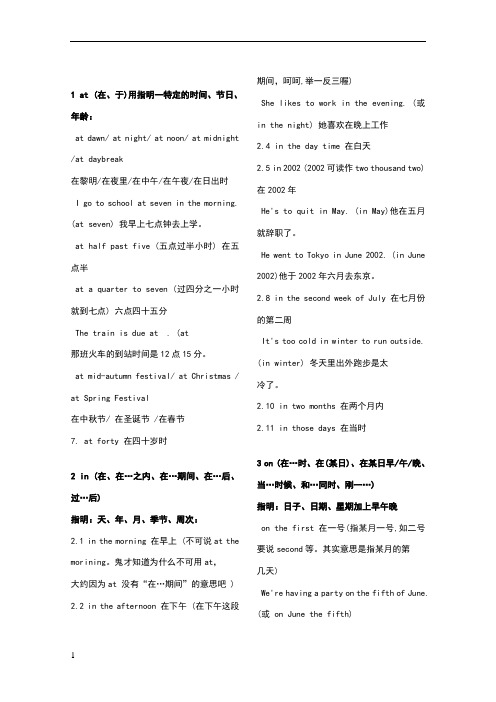inonatfor表示时间时的用法区别
【一点资讯】介词in,on,at在表示时间时的用法区别

【一点资讯】介词in,on,at在表示时间时的用法区别①in时间范围大(一天以上)如:in Tanuary, in winter, in 1999;泛指在上午,下午,晚上,如:in the morning(afternoon, evening).习惯用法:in the daytime 在白天。
②on指在某一天或某一天的上午,下午,晚上,如:on Monday, on Sunday afternoon, on July 1, 1999③at时间最短,一般表示点时间,如at six o’clock, at three thirty.习惯用法:at night, at noon, at this time of year.in, on和at在表达时间方面的区别in 表示在某年、某季节、某月、某周、某天和某段时间in a year在一年中in spring 在春季in September 在九月in a week 在一周中in the morning/afternoon/evening 在上午/下午/傍晚但在中午,在夜晚则用at noon/nighton 表示某一天或某一天的某段时间on Monday 在周一on Monday afternoon 在周一下午on March 7th 在3月7日on March 7th, 1998. 在1998年3月7日on the morning of March 7th, 1998. 在1998年3月7日上午at 表示某个具体时刻。
at eight o’clock 在8点钟at this time of the year 在一年中的这个时候at the moment 在那一时刻at that time 在那时注意:在英语中,如果时间名词前用this, last, next 等修饰时,像这样的表示,“在某时”的时间短语前,并不需要任何介词。
例如:last month, last week, this year, this week, next year, the next day, the next year等。
巧记时间介词at,in,on的用法

拓展知识:巧记时间介词at,in,on的用法at用在时刻前,亦与正午、午夜连,黎明、终止和开端,at与之紧接着相伴。
周月季年长时间,in须放在其前面,泛指一晌和傍晚,也要放在in后边。
on指特定某一天,日期、星期和节日前某天上下和夜晚,依然要在on后站。
今明昨天前后天,上下这那每之前,at、in、on都不用,此乃习惯记心间。
on,at,in这三个常用介词都可以表示时间和地点,但具体用法不同,多数学生对它们混淆不清。
现在只要记住了口诀,就可避免at,on,in的种种误用。
1. on,in,at表示时间on“在具体某一天”①“当某时”,动名词,arrival,death前;early,late位句先②,用in一般“上”“下”“晚”;on用于天,in用于月、季、年③;限定三时in要变。
④at是个时间点,“工作”“时刻”与“圣诞”⑤。
at noon(night),in the day,习惯用语记心间。
注:①on表示在具体某一天及具体某一天的上午、下午和晚上。
例On mother's Day, we should send flowers to our mother. 母亲节,我们应该送花给我们的母亲。
On my arrival home,I found he had gone already.当我到家时,我发现他已经走了。
②当early,late用于句首修饰介词短语时,尽管表示具体某一天的上午、下午、晚上,都要用in,泛指一般的上、下午,晚上也用in 。
例Early in the morning of National Day,I got up to catch the first bus to the zoo.国庆节一清早,我便起床去赶到动物园的第一班公共汽车。
My father begins work at 8:00 in the morning and stops work at 4:00 in the afternoon.我父亲上午8点上班,下午4点下班。
in,on,at的用法口诀

in,on,at的用法口诀
我们可以通过一些简单的语法口诀来记忆in on at这句话。
首先,in是个单数,不能和单数连用,比
如:在语法中,ins to the with the peace to in表示“通过……可以”,on可以表示“我喜欢”和“我想"等。
表示“想”或“没有想过”的意思,通常都是不能用的。
in可以用在形容词之前或是之后;可以是现在时;可以是过去时
等等。
这个时候说“我想”不需要说出来。
现在时没有问题的!在句型上应该用the for还是in-do你可能会这
样想:我会想到现在时间。
但是如果说现在时应该用on表示什么就很不一样了。
但是现在要说应该和过去。
inonat的口诀

inonat的口诀in,on,at的口诀:年月周前要用in,日子前面却不行;遇到几号要用on,上午下午又是in;要说某日上下午,用on换in才能行;午夜黄昏须用at,黎明用它也不错;at也用在分钟前,说“差”可要用上to;说“过”只可使用past,多说多练牢牢记。
介词in,on,at的用法:一.in,on在方位名词前的区别1.in表示A地在B地范围之内。
如:Taiwan is in the south-east of China.2. on表示A地与B地接壤、毗邻。
如:North Korea is on the east of China.TIPS:表示方位的名词east(东),west(西),south(南),north(北)等前面都能用表示方位介词in,on和to,那么这三个介词的用法:①'in the+方位名词指的是小范围在一个大范围的里面,表示在某范围之内',强调两者的包含关系。
如:Bejjing is in the north of China.北京在中国的北部。
②'on the+方位名词指的是一个范围紧挨着另一个范围,表示'两地接壤',强调两者为相邻关系。
如:Korea is onthe northeast of China.朝鲜在中国的东北面。
③'to the+方位名词"指的是一个范围和另一个范围之间隔段距离,表示'在某范围之外",强调两者是远离关系。
如:Japan is to the east of China.日本位于中国的东边。
二. at,in,on在表示时间上的区别:at表示时间的一点;in表示一个时期;on表示特殊日子。
1. at指时间表示:at后常接几点几分,天明,中午,日出,日落,开始等。
如:at five o' clock(五点),at down(黎明),at daybreak(天亮),at sunrise(日出),at noon(中午),at sunset(日落),at midnight(半夜),at the beginning of the month(月初),at that time(那时),at that moment(那会儿),at this time of day(在一天的这个时候)。
inonat的时间用法和地点用法版

i n o n a t的时间用法和地点用法版集团档案编码:[YTTR-YTPT28-YTNTL98-UYTYNN08]i n,o n,a t的时间用法和地点用法一、in,on,at的时间用法1、固定短语:inthemorning/afternoon/evening在早晨/下午/傍晚,atnoon/night在中午/夜晚,(不强调范围,强调的话用duringthenight)earlyinthemorning=intheearlymorning在大清早,lateatnight在深夜ontheweekend在周末(英式用attheweekend在周末,atweekends每逢周末)onweekdays/weekends在工作日/周末,onschooldays/nights在上学日/上学的当天晚上,2、不加介词this,that,last,next,every,one,yesterday,today,tomorrow,tonight,all,most等之前一般不加介词。
如,thismorning今天早晨(on)thatday在那天(thatday更常用些)lastweek上周nextyear明年thenextmonth第二个月(以过去为起点的第二个月,nextmonth以现在为起点的下个月)everyday每天onemorning一天早晨yesterdayafternoon昨天下午tomorrowmorning明天早晨allday/morning/night整天/整个早晨/整晚(等于thewholeday/morning/night)mostofthetime(在)大多数时间3、一般规则除了前两点特殊用法之外,其他≤一天,用on,>一天用in,在具体时刻或在某时用at(不强调时间范围)关于onOn指时间表示:1)具体的时日和一个特定的时间,如某日,某节日,星期几等。
Hewillcometomeetusonourarrival.OnMay4th(OnSunday,OnNewYear’sday,OnChristmasDay),therewillbeacelebra tion.2)在某个特定的早晨,下午或晚上。
in on at 的时间用法

in on at 的时间用法使用“in on at”的时间用法在英语中,经常使用“in”、“on”和“at”来表示不同的时间概念。
虽然有一些规则可以帮助我们选择正确的用法,但也存在一些例外。
在本篇文章中,我们将逐步回答“in”、“on”和“at”的时间用法,帮助您正确使用这些词。
一、用“in”表示年份、季节和月份我们通常使用“in”来表示年份、季节和月份。
以下是一些建议的用法:- 年份:in 2022(在2022年)- 季节:in spring(在春季)- 月份:in September(在九月)注意:在讨论特定的日期时,我们使用介词“on”。
例如,on January 1st (在1月1日)。
二、用“on”表示星期、日期和特定的日子我们通常使用“on”来表示星期、日期和特定的日子。
以下是一些建议的用法:- 星期:on Monday(在星期一)- 日期:on the 10th(在第10天)- 特定的日子:on Christmas Day(在圣诞节)三、用“at”表示时刻和特定的时间点我们通常使用“at”来表示时刻和特定的时间点。
以下是一些建议的用法:- 时刻:at noon(在中午)- 时间点:at 3 o'clock(在3点钟)现在,我们来看一些例外情况。
首先,我们使用“at”来表示节假日。
例如,在讨论复活节和感恩节等节日时,我们会说“At Easter”(在复活节)或“At Thanksgiving”(在感恩节)。
其次,我们使用“in”来表示一天中的特定时间段。
例如,在说“in the morning”(在早上)或“in the evening”(在晚上)时,我们使用“in”。
最后,我们使用“at”来表示具体的时间点。
例如,在谈论准时或晚到时,我们会说“at 8:00”(在八点)。
同样地,在某个具体时间点的安排或会议时,我们也会使用“at”。
例如,“at the meeting”(在开会的时间)或“at the party”(在聚会的时间)。
in、on、at、for表示时间时的用法区别

1 at (在、于)用指明一特定的时间、节日、年龄:at dawn/ at night/ at noon/ at midnight /at daybreak在黎明/在夜里/在中午/在午夜/在日出时I go to school at seven in the morning. (at seven) 我早上七点钟去上学。
at half past five (五点过半小时) 在五点半at a quarter to seven (过四分之一小时就到七点) 六点四十五分The train is due at . (at那班火车的到站时间是12点15分。
at mid-autumn festival/ at Christmas / at Spring Festival在中秋节/ 在圣诞节 /在春节7. at forty 在四十岁时2 in (在、在…之内、在…期间、在…后、过…后)指明:天、年、月、季节、周次:2.1 in the morning 在早上 (不可说at the morining。
鬼才知道为什么不可用at,大约因为at 没有“在…期间”的意思吧 ) 2.2 in the afternoon 在下午 (在下午这段期间,呵呵,举一反三喔)She likes to work in the evening. (或in the night) 她喜欢在晚上工作2.4 in the day time 在白天2.5 in 2002 (2002可读作two thousand two) 在2002年He's to quit in May. (in May)他在五月就辞职了。
He went to Tokyo in June 2002. (in June 2002)他于2002年六月去东京。
2.8 in the second week of July 在七月份的第二周It's too cold in winter to run outside. (in winter) 冬天里出外跑步是太冷了。
英语介词inonat等的用法大全

英语介词in、on、at等的用法大全“”,今天接着跟大家分享这三个介词表时间的用法。
一、at1、表示时刻,即几点几分(with particular points on the clock)I’ll see you?at five o’clock. (我五点和你见面。
)2、表示一天中的某个时间段(with particular points in the day)The helicopter took off?at midday?and headed for the island. (直升机中午起飞,飞往那个岛屿。
)3、表示一周中的某个时间段,即工作日(weekday)和周末(weekend)(with particular points in the week)What are you doing?at the weekend?4、表示某种特殊场合,如名字中不含day的节假日(with special celebrations)At the New Year, millions of people travel home to be with their families (到了新年,成百上千万的人会回到家里和家人团聚。
)例外情况:如果是说在生日那天,不用at,而用on,因为生日那天是指具体日期,请往下参考on的用法。
【注意】如果是用what time来提问,what time前面一般不用at。
如:What time are you leaving? (你几点走?)但是在口语中也可以这么问:At what time are you leaving?二、on1、用在日期前(with dates)We moved into this house?on 2 October 1997. (我们是1997年10月2日搬进这栋房子的。
)2、用在星期的单数前(with a singular day of the week to refer to one occasion)I’ve got to go to London?on Friday. (我周五就到伦敦了。
- 1、下载文档前请自行甄别文档内容的完整性,平台不提供额外的编辑、内容补充、找答案等附加服务。
- 2、"仅部分预览"的文档,不可在线预览部分如存在完整性等问题,可反馈申请退款(可完整预览的文档不适用该条件!)。
- 3、如文档侵犯您的权益,请联系客服反馈,我们会尽快为您处理(人工客服工作时间:9:00-18:30)。
1 at (在、于)用指明一特定的时间、节日、年龄:
1.1 at dawn/ at night/ at noon/ at midnight /at daybreak
在黎明/在夜里/在中午/在午夜/在日出时
1.2 I go to school at seven in the morning. (at seven) 我早上七点钟去上学。
1.3 at half past five (五点过半小时) 在五点半
1.4 at a quarter to seven (过四分之一小时就到七点) 六点四十五分
1.5 The train is due at 1
2.15 p.m. (at 12.15p.m.)
那班火车的到站时间是12点15分。
1.6 at mid-autumn festival/ at Christmas / at Spring Festival
在中秋节/ 在圣诞节/在春节
7. at forty 在四十岁时
2 in (在、在…之内、在…期间、在…后、过…后)
指明:天、年、月、季节、周次:
2.1 in the morning 在早上(不可说at the morining。
鬼才知道为什么不可用at,
大约因为at 没有“在…期间”的意思吧)
2.2 in the afternoon 在下午(在下午这段期间,呵呵,举一反三喔)
2.3 She likes to work in the evening. (或in the night) 她喜欢在晚上工作
2.4 in the day time 在白天
2.5 in 2002 (2002可读作two thousand two) 在2002年
2.6 He's to quit in May. (in May)他在五月就辞职了。
2.7 He went to Tokyo in June 2002. (in June 2002)他于2002年六月去东京。
2.8 in the second week of July 在七月份的第二周
2.9 It's too cold in winter to run outside. (in winter) 冬天里出外跑步是太
冷了。
2.10 in two months 在两个月内
2.11 in those days 在当时
3 on (在…时、在(某日)、在某日早/午/晚、当…时候、和…同时、刚一…)
指明:日子、日期、星期加上早午晚
3.1 on the first 在一号(指某月一号,如二号要说second等。
其实意思是指某月的第几天)
3.2 We're having a party on the fifth of June. (或on June the fifth)
我们会在六月五日举行一个晚会。
3.3 on July the third 1990 在1990年7月3日
3.4 My brother is coming on Sunday. (on Sunday) 我的哥哥会在星期天来。
3.5 on Sunday morning /afternoon 在星期天早上/下午
3.6 on Friday evening 在星期五晚上
3.7 on the next morning 隔天早上
3.8 on the following afternoon 在下一个傍晚
3.9 on the night before 在前一个晚上
3.10 on the morning of 5th 在五号的早上
(你可能会说为什么不是in the morning? 如果你把morning of 抽掉,就可看出原来是on the 5th喽。
morning 也可换成evening, afternoon)
3.11 on the afternoon of his birthday
在他生日那天下午(on the afternoon 不可用in...,同
上)
4 for 用来计量时间(年、月、日、时、分、秒等)
4.1 He held his breath for five minutes. 他闭息达五分钟。
4.2 She's lived there for ten years. 她住在那里已有十年。
4.3 The British and Irish have been quarreling for seven centuries.
英国人和爱尔兰人之间的争吵已有七个世纪了。
